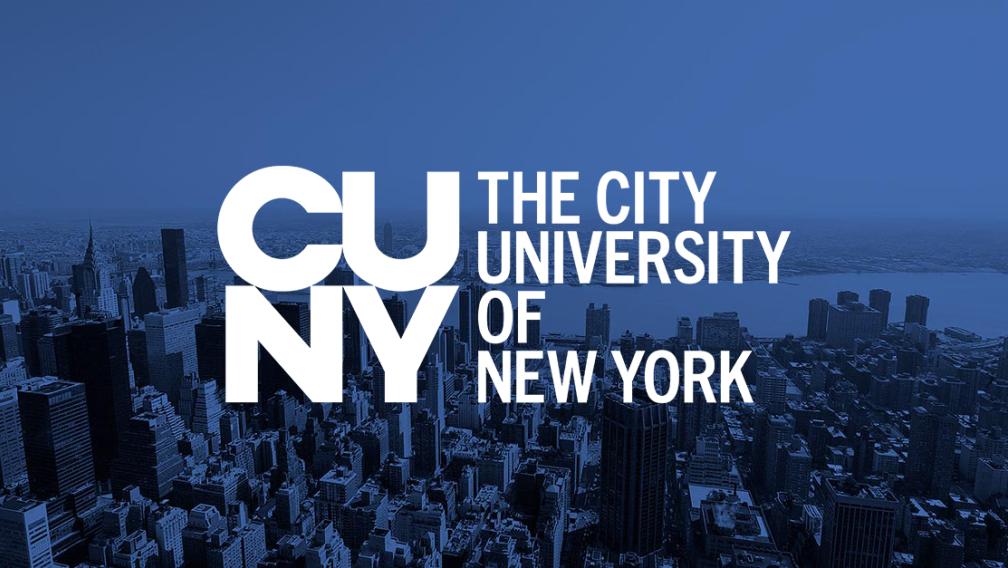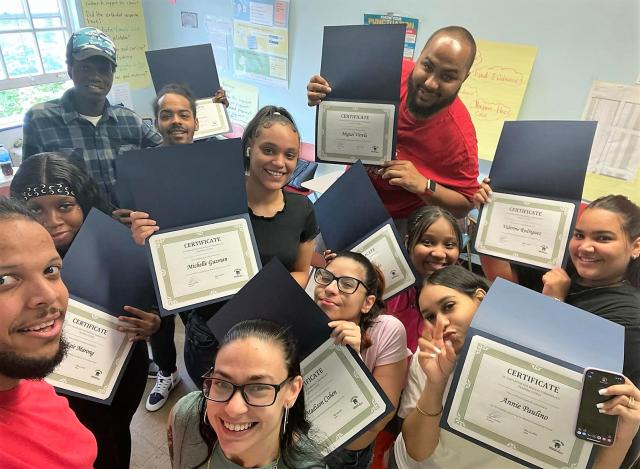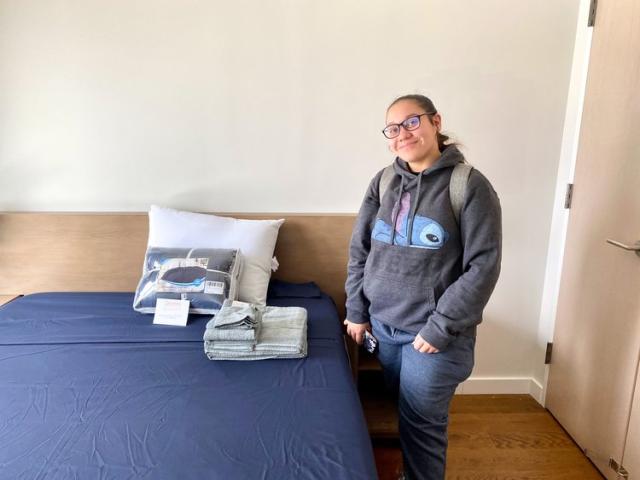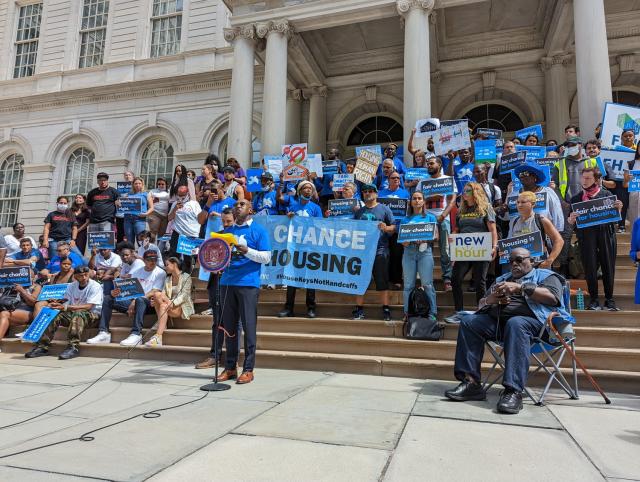The City University of New York (CUNY) first opened its doors in 1847 with the founding of The Free Academy, the nation’s first free public institution of higher education. Over the 175 years that followed, CUNY has grown into the nation’s largest public university with 25 campuses that serve 243,000 degree-seeking students each year. Through its growth, CUNY has held to its historic mission and continues to provide a high-quality education that can be “a transformative engine of upward social mobility” for New Yorkers of all backgrounds.
In line with its mission, CUNY is committed to disrupting “the long-lasting impact of a conviction record by making its educational and professional pathways accessible to all.” A network of CUNY programs and initiatives provide mentorship and support services developed specifically for students whose lives have been impacted by the criminal legal system, in addition to engaging in research and advocacy around rights historically denied to justice-involved people. Since 2019, Trinity has supported and accelerated this work through fourteen grants for key programs and initiatives totaling $4,280,000.
Academic & Professional Support
Many people who return to the community from incarceration seek stability through education but face pernicious barriers that make their pursuit of a degree more onerous. With Trinity’s support, CUNY has provided essential services at two of its community college campuses that meet the specific needs of justice-impacted students, helping them to move forward with their academic pursuits by addressing these barriers.
Future Now was launched at Bronx Community College (BCC) in 1998. It is a high school equivalency (HSE), vocational, and college pathways program that serves 1,500 students each year, 95% of whom have been impacted by the justice system. Future Now offers free HSE and vocational training classes, student counseling, college preparation, and enrollment services to ensure students have the knowledge, skills, and networks needed to enter and succeed in the labor market.
After decades of proven success, Trinity supported the expansion of Future Now’s programming in 2022. Healthcare is currently the largest employment sector in the Bronx, accounting for more than a quarter of all private-sector jobs in the borough, and opportunities in this sector are likely to grow. To help its justice-impacted students obtain positions in this sector, the Office of Workforce Development and Continuing Education at BCC will work with Future Now to expand its current program model to include certificate programs in the allied health sector. For this pilot phase, Future Now is introducing Phlebotomy, Electrocardiography, EMT, and Certified Nursing Assistant training sessions for 75 Future Now students.
In 2019, Project Impact (PI) was launched at the Borough of Manhattan Community College (BMCC), which enrolls approximately 1,500 justice-impacted students each year. PI aims to connect justice-impacted students with peer mentors trained to support them through navigating the challenges of higher education and access to resources. Mentors ensure students are connected with the counseling, tutoring, administrative, legal, and personal support they need to achieve academic success. Since its launch, PI has strengthened its “feeder” programs with Rikers Island and CUNY’s HSE programs while also expanding its services. As a result, PI has grown from a program with only one student to now supporting over 200. Learn more about PI from program participants, mentors, and staff in the following video:
Safe & Secure Housing
After the first few years of PI’s success, it became clear that it was difficult for students navigating housing instability to reap the full benefits of the program. At the same time, concerns about housing-insecure college students attending CUNY schools were rising. A 2019 report by the Hope Center for College, Community, and Justice showed that 55% of CUNY students surveyed reported experiencing housing insecurity—and that 14% had been homeless in the previous year.
Housing insecurity takes a significant toll on an individual’s physical and mental health. For housing-insecure college students who have to balance their basic needs with their academic goals, accessing the benefits of higher education is extremely difficult. The PI, BMCC, and Trinity teams believed if housing-insecure students could get housing and other basic needs met, it would give them the stability and support they need to achieve their academic goals, start on a path to greater financial resilience, and succeed beyond their time at CUNY.
In response, the teams established year-round housing for up to 40 homeless or housing-insecure BMCC students—from PI and BMCC at large—in a dorm with on-site resident advisors. In addition to stable housing, the dorm would provide a sense of community and the opportunity for students to connect with peers who share similar experiences. Students began moving into the dorms in late 2022, and are already benefiting from the safe space and supportive community.
In addition to their work with CUNY on the BMCC dorm project, in October 2022 Trinity partnered with Neighborhood Coalition for Shelter (NCS), a longtime leader in the New York housing solutions space, to launch the NCS Scholars pilot program. Like the BMCC dorm project, NCS Scholars provides year-round housing and supportive services for unhoused CUNY students. NCS Scholars currently provides housing for students at Medgar Evers College in Crown Heights in Brooklyn, La Guardia College in Queens, and students who were referred to the program through NYC’s Department of Youth and Community Development (DYCD) shelters.
While still in the early stages, Trinity hopes these partnerships with BMCC and NCS can be replicated throughout the CUNY system and in other parts of the country to ensure all housing-insecure college students have the space they need to thrive.
Research & Advocacy
In addition to the essential direct service work supporting justice-involved students across its campuses, CUNY engages in various research and advocacy initiatives that address the underlying causes of mass incarceration and mass homelessness. By focusing on the root causes of these issues, Trinity and CUNY hope to reduce the number of incarcerated individuals and remove barriers to reentry for those that have been incarcerated.
Between 2020 and 2021, Trinity supported The Institute for Justice and Opportunity (the Institute) at John Jay College’s Fair Chance for Housing advocacy work. This campaign aims to reduce housing exclusions based on prior involvement with the justice system in public housing and government-supported affordable housing developments. The Institute and its coalition focuses on overturning restrictions within the New York City Housing Authority (NYCHA), the city’s largest affordable housing provider, and changing the way landlords and developers assess rental applicants. In 2021 the Institute’s advocacy work resulted in significant changes to NYCHA and the NYC Department of Housing and Preservation and Development policies and practices as well as building active and consistent participation in the Fair Chance for Housing campaign.
Since 2020, Trinity has supported The Data Collaborative for Justice (DCJ) at John Jay College to educate policymakers and the public about trends in criminal convictions in New York. DCJ analyzed criminal conviction records in New York City from 1980 through 2019 and authored a research report with findings about charge severity and charge category, length of time since the conviction, and demographics. Building on that research, DCJ conducted and published a second round of analysis that covers all of New York State and engaged in local, state, and national communications activities to educate policymakers and the public about its research findings.
In NYC, there are nearly 750,000 people who now carry criminal conviction records -- 4 in 10 have a single conviction on their record. pic.twitter.com/KfGfS6VyhN
— Data Collaborative for Justice (@dataforjustice) April 14, 2021
More recently, Trinity supported a DCJ research initiative that studied racial disparities in New York City’s jails from 2016 to 2021. These findings were published in a report and in a set of interactive maps, which presents a visual demonstration of racial disparities within New York City neighborhoods. Following the report’s publication, DCJ conducted a research briefing with Trinity Racial Justice Initiative grantees to disseminate data and information that could be integrated into their policy and advocacy work.
With Trinity’s support, CUNY’s robust network of programs, research projects, and initiatives focused on justice-impacted individuals and the broader criminal legal system work together to make higher education more accessible. In time, these efforts have the potential to reduce mass incarceration and mass homelessness and build a more equitable New York City.



